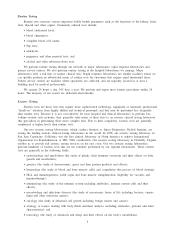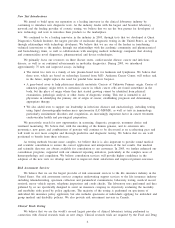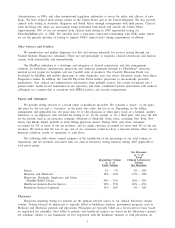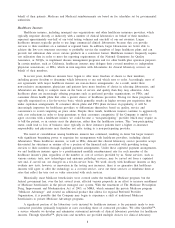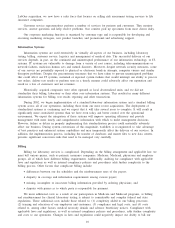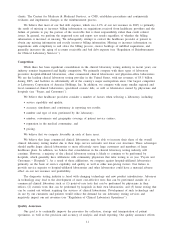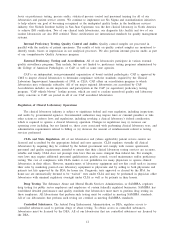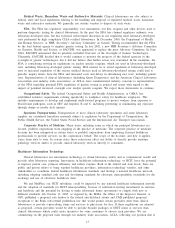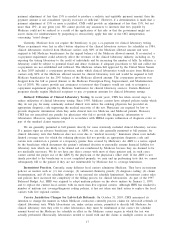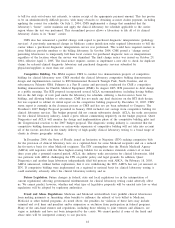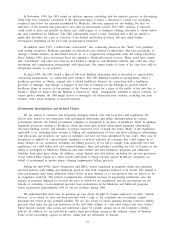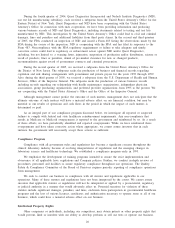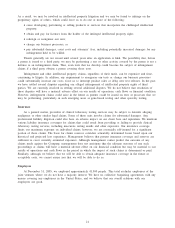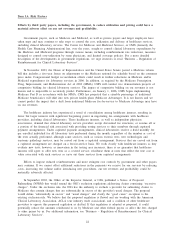Quest Diagnostics 2005 Annual Report Download - page 29
Download and view the complete annual report
Please find page 29 of the 2005 Quest Diagnostics annual report below. You can navigate through the pages in the report by either clicking on the pages listed below, or by using the keyword search tool below to find specific information within the annual report.focus on proficiency testing, process audits, statistical process control and personnel training for all of our
laboratories and patient service centers. We continue to implement our Six Sigma and standardization initiatives
to help achieve our goal of becoming recognized as the undisputed quality leader in the healthcare services
industry. Our Nichols Institute facility in San Juan Capistrano was the first clinical laboratory in North America
to achieve ISO certification. Two of our clinical trials laboratories, our diagnostic kits facility and two of our
routine laboratories are also ISO certified. These certifications are international standards for quality management
systems.
Internal Proficiency Testing, Quality Control and Audits. Quality control samples are processed in
parallel with the analysis of patient specimens. The results of tests on quality control samples are monitored to
identify trends, biases or imprecision in our analytical processes. We also perform internal process audits as part
of our comprehensive Quality Assurance program.
External Proficiency Testing and Accreditation. All of our laboratories participate in various external
quality surveillance programs. They include, but are not limited to, proficiency testing programs administered by
the College of American Pathologists, or CAP, as well as some state agencies.
CAP is an independent, non-governmental organization of board certified pathologists. CAP is approved by
CMS to inspect clinical laboratories to determine compliance with the standards required by the Clinical
Laboratory Improvement Amendments of 1988, or CLIA. CAP offers an accreditation program to which
laboratories may voluntarily subscribe. All of our major regional laboratories are accredited by CAP.
Accreditation includes on-site inspections and participation in the CAP (or equivalent) proficiency testing
program. “CAP whistle blower’’ hotline posters, which are used to escalate unresolved quality and laboratory
safety concerns to CAP, are posted in all of our CAP accredited laboratories.
Regulation of Clinical Laboratory Operations
The clinical laboratory industry is subject to significant federal and state regulation, including inspections
and audits by governmental agencies. Governmental authorities may impose fines or criminal penalties or take
other actions to enforce laws and regulations, including revoking a clinical laboratory’s federal certification,
which is required to operate a clinical laboratory operation. Changes in regulations may (i) increase our
operating costs including, but not limited to, those costs associated with performing clinical laboratory tests, and
administrative requirements related to billing or (ii) decrease the amount of reimbursement related to testing
services performed.
CLIA and State Regulation. All of our laboratories and (where applicable) patient service centers are
licensed and accredited by the appropriate federal and state agencies. CLIA regulates virtually all clinical
laboratories by requiring they be certified by the federal government and comply with various operational,
personnel and quality requirements intended to ensure that their clinical laboratory testing services are accurate,
reliable and timely. CLIA does not preempt state laws that are more stringent than federal law. For example,
state laws may require additional personnel qualifications, quality control, record maintenance and/or proficiency
testing. The cost of compliance with CLIA makes it cost prohibitive for many physicians to operate clinical
laboratories in their offices. However, manufacturers of laboratory equipment and test kits could seek to increase
their sales by marketing point-of-care laboratory equipment to physicians and by selling to both physicians and
patients test kits approved by the FDA for home use. Diagnostic tests approved or cleared by the FDA for
home use are automatically deemed to be “waived’’ tests under CLIA and may be performed in physician office
laboratories with minimal regulatory oversight under CLIA as well as by patients in their homes.
Drug Testing. The Substance Abuse and Mental Health Services Administration, or SAMHSA, regulates
drug testing for public sector employees and employees of certain federally regulated businesses. SAMHSA has
established detailed performance and quality standards that laboratories must meet to perform drug testing on
these employees. All laboratories that perform such testing must be certified as meeting SAMHSA standards.
All of our laboratories that perform such testing are certified as meeting SAMHSA standards.
Controlled Substances. The federal Drug Enforcement Administration, or DEA, regulates access to
controlled substances used to perform drugs of abuse testing. To obtain access to controlled substances,
laboratories must be licensed by the DEA. All of our laboratories that use controlled substances are licensed by
the DEA.
12





